SUMMARY
This is AI generated summarization, which may have errors. For context, always refer to the full article.
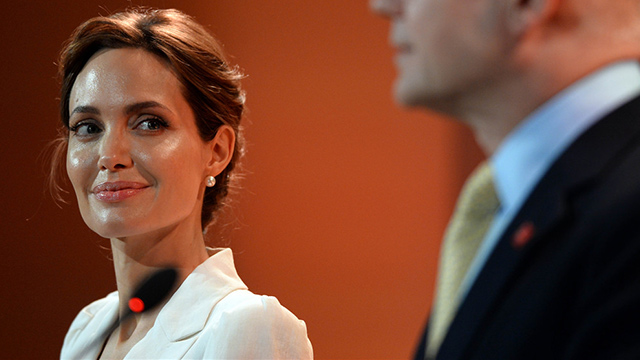
LONDON, United Kingdom – Passion can inspire change.
That’s the fundamental idea behind the unlikely partnership of British Foreign Minister William Hague and Angelina Jolie bringing global focus to sexual violence in conflict.
“Angelina brings what governments cannot bring,” said Hague. “She has the power to speak to the whole world, to raise awareness, to change attitudes.”
“That’s why I’m here,” said Tsonka Petkova at the Fringe exhibition of the Global Summit to End Sexual Violence in Conflict in east London. The ExCel venue was far from the center of London, but she came because she wanted to support Angelina Jolie.
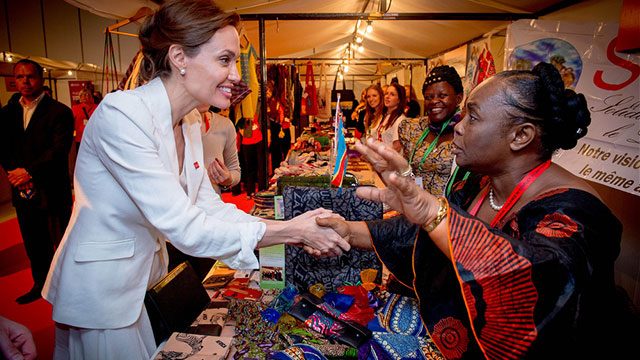
“She’s very passionate, and I want to aspire to be someone like her,” said Petkova, who has a degree in occupational and organizational psychology. Originally from Bulgaria, she’s lived most of her life in London. “She’s a global human being. She sees we’re all connected, and I want to think like that. She’s pushing us to be better.”
It was a global meeting like no other. That was what Hague promised, and that was what it was.
“Today in our networked world, relations between countries are made up of a network of ties between individuals, businesses, NGOs, campaigners,” said Hague. “That’s why I was determined that this would be a summit like no other that had ever been held, bringing together not just governments but a whole mix of people who help to drive opinion and bring expertise.”
As ministers from 123 countries met upstairs, survivors and civil society groups, non-governmental organizations set up booths downstairs – an exhibition of the suffering and help available globally. There were hundreds of discussions, music programs and plays. That was open to the public, many of whom came because of Angelina Jolie’s star power.
“I love her as an actress, and with Brad Pitt, obviously, I follow,” Petkova admitted. “I followed her travels, and I read the books she recommended, and she opened my eyes about a whole world out there, and that I can do more.”
As a member of the Philippine delegation and of media, I had access to all the sessions (some of which were closed to the public and media). I’ve reported on numerous summits – from the annual ASEAN, APEC, OIC, and others, but this was different. In terms of engagement and mood, the closest I could compare it to in terms of exuberance was the 1995 Beijing Women’s Conference.
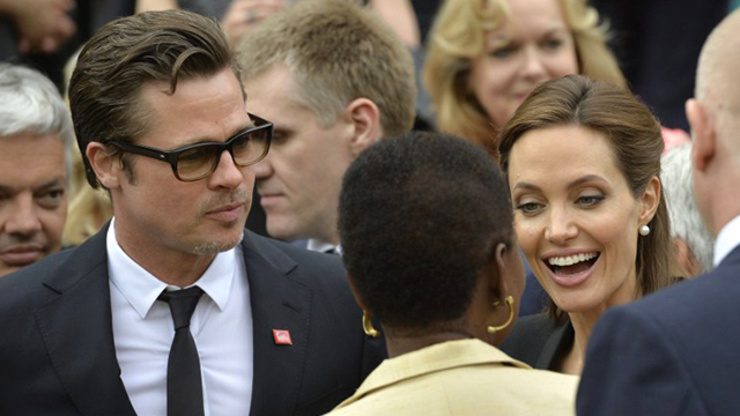
There was no doubt having Angelina Jolie and her partner, Brad Pitt, there had an effect.
I was sitting with the ministers’ delegation when the couple entered, and the ministers around me craned their necks for a better view. One murmured, “They’re not human.”
Wild child turns advocate
In many ways, Angelina Jolie’s story is itself inspirational – a public transformation from the wild child whose mother allowed her a live-in boyfriend at age 14, who admitted she was bisexual and who once harmed herself.
She is twice divorced, better known in her younger days for her tattoos, hard-drug use and a searing kiss with her brother. Not to mention, she could also be classified as a home-wrecker – after all, Brad Pitt left his wife, Jennifer Aniston, after meeting Jolie on the set of their movie, Mr. & Mrs. Smith.
But Jolie has transcended all this. The wild girl is now a woman with a cause, and she has the power to take the world with her.
Those who knew her said the transformation began in 2001 when she filmed her movie, Tomb Raiders, in Cambodia and adopted a son from there. Now she and Brad Pitt have 6 children, 3 of whom are adopted.
That was the same year she travelled to Sierra Leone as a UNHCR Goodwill Ambassador. That was when she began to immerse herself in humanitarian issues leading to at least 40 field trips to affected nations, including a recent visit to Bosnia that moved her to tears.
The tragedy in Bosnia-Herzegovina brought Jolie and Hague together in more ways than one. After Hague saw her film, he asked her to work with him.
In 2011, Jolie wrote and directed In the Land of Blood and Honey, a romance set against the backdrop of the Bosnian war from 1992-1995. Jolie immersed herself in the conflict which killed more than 100,000 people, and where the UN says up to 60,000 women were raped by men who were systematically using rape as a tool for ethnic cleansing.
On the 3rd night of the conference, Jolie introduced a screening of her film.
“I struggled to understand how it was possible for people to be capable of such crimes, and why it so often took the form of brutal sexual violence,” Jolie said. “And I was horrified by the fact that it took so long for the rest of the world to intervene to stop it. It just really seemed incomprehensible.”
During her summit statements, Jolie brought up the kidnapping of the schoolgirls in Nigeria by Boko Haram, the rapes in India and Pakistan, Liberia, the Democratic Republic of Congo.
A celebrity who listens
This is no shallow celebrity endorsement.
The same passion that drove her when she was younger is still apparent.
Jolie spent the entire 4 days in the ExCel venue talking to people, walking around the booths, visibly moved by the stories of the survivors.
At the beginning, she was swarmed, and at least 6 people in red T-shirts as well as her security, walked with her to help part the crowd, but slowly, the crowd got used to her.
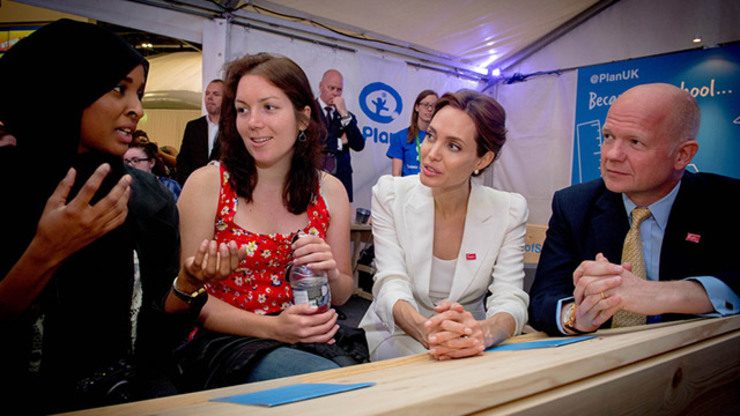
A member of the Philippine delegation describes one encounter because she was right behind Jolie when a man stopped her.
“I was overwhelmed and speechless,” said the delegate. “She was so human and very, very sincere. This Congolese guy called her, ‘Angelina, Angelina.’ He said, ‘Say something about Congo,’ and she said, ‘what do you want me to say?’”
“The guy didn’t even have an ID. He wasn’t a delegate. He was part of the public. It didn’t matter to her. When the man was speaking, she said, ‘Ok, what is your message to me? What do you want me to do?’”
“She was really listening, and she knew what she was talking about. When it became sloganeering, she cut him and said, ‘Ok, you want me to say something about corruption in government’ and she mentioned other problems. She held the guy’s hand, and before they ended the conversation, she asked for his name. ‘Ok, Brando, I’ll be back here tomorrow.’”
Two nights later before her film was shown, Jolie outlined the effect she wanted to have on her audience.
“If I have a hope, it is that it will make people more understanding and more thoughtful about Bosnia-Herzegovina, which needs more support today than it is getting from the international community,” said Jolie.
“I also hope that when you watch this film, you think about Syria. It seems unthinkable that nearly 20 years after the siege of Sarajevo, we see Syrian cities like Homs and Aleppo besieged and bombarded – that 9 million Syrians have been driven from their homes and nearly 3 million refugees are in neighboring countries, all bearing stories of murder, starvation and rape.”
“And it does feel at the moment that the international community has given up on trying to restart negotiations, but our response to such desperate humanitarian suffering can never be to give up.”
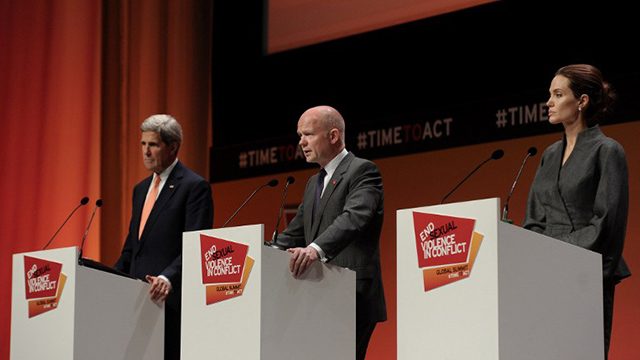
At the summit close, Jolie shared the stage with US Secretary of State John Kerry and Britain’s Foreign Secretary William Hague.
Jolie’s words about Syria the night before were echoed by both men as they discussed Iraq, saying the power vacuum in Syria helped create what they have to deal with today.With the ongoing crisis in Iraq, what either man said was breaking news.
As the two men discussed possible military action and responses to the ongoing crisis, Jolie reminded the world about the core of the summit: “Warzone rape is not simply a women’s issue. It is not a humanitarian issue. It goes to the heart of international peace and security.”
It’s unprecedented to hear from a Hollywood actress at a time like that, but expect to see more because Hague described the summit as “a strong example of the future of foreign policy and how it should be conducted.”
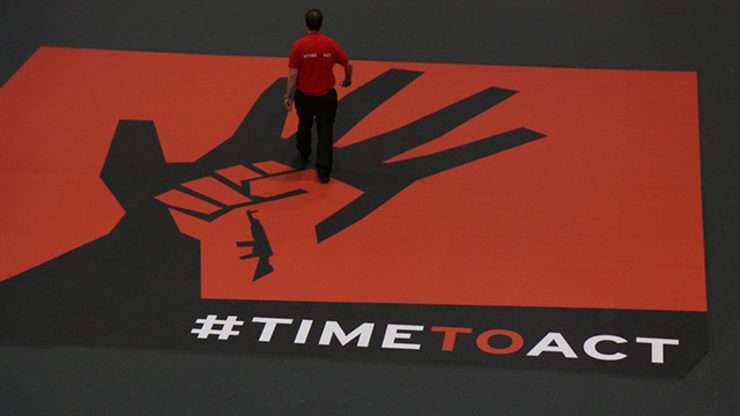
Perhaps that’s the right approach in the age of social media, when direct access to the public makes a difference, and a woman like Jolie can turn star power into a spotlight on international issues.
“We’ve all watched her play many remarkable roles,” said Kerry. “But perhaps her most lasting legacy actually comes from a role that she plays in real life, and that is the role of fierce and fearless advocate.” – Rappler.com
Related stories:
- Ending warzone rape: A cause for our generation
- Two Filipinas represent PH in London global summit
- Angelina Jolie co-hosts London summit vs sexual violence in conflict
- Jolie: We can end use of rape as weapon of violence
- Jolie, Hague mobilize global action vs rape in war
- Jolie and Hague launch International Protocol for sexual violence
- Brad Pitt adds support to Jolie at warzone rape meeting
- AS IT HAPPENS: Summit to end sexual violence: Ministers’ Day
- AS IT HAPPENS: Summit to end sexual violence: Closing plenary
- Nigerian schoolgirls ‘a heinous example of sexual violence’
- #TimeToAct Hangout: End Sexual Violence in Conflict
- Angelina Jolie, warzone rape, and the celebrity effect
- Banish sexual violence ‘to dark ages’ – Kerry
- Was Maleficent ‘raped’?
- Britain makes Angelina Jolie an honorary dame
- Kerry, Hague, Jolie on Iraq and wartime rape
Add a comment
How does this make you feel?
There are no comments yet. Add your comment to start the conversation.